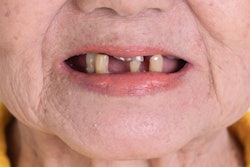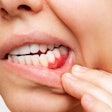
Our mouth is home to the second-largest microbial community in our body known as the oral microbiome. Trillions of microbes and more than 700 unique species of bacteria live in our oral cavity -- on our tongue, cheeks, teeth, and in every little crevice. On average, an individual has between 100 to 200 unique species of oral bacteria.
When this community becomes imbalanced and enters a state of dysbiosis, pathogenic anaerobic and cariogenic species grow in number, which in turn leads to tooth decay and gum disease.
The relationship between the oral microbiome and oral disease has long been established, but recently, we've come to better understand that the oral microbiome's influence goes beyond the mouth, impacting one's systemic health.
5 ways oral bacteria impact systemic health
1. Cognitive decline

One area of emerging interest is the association between gum disease-causing bacteria and cognitive decline. Research has shown poor oral health to be associated with cognitive decline, including correlations specifically between tooth loss and dementia. Adults with more tooth loss had a 1.48 times higher risk of developing cognitive impairment and a 1.28 times higher risk of being diagnosed with dementia, even after controlling for other factors.
However, many studies to date have only correlated the occurrence of poor oral health and cognitive decline. New technologies are enabling a deeper view of the relationship between these two conditions, and studies suggest that gum disease may contribute to and progress Alzheimer's disease.
A growing body of evidence suggests that one oral pathogen, Porphyromonas gingivalis, may be a key link between oral health and cognitive health. P. gingivalis antigens have been identified in the brains of patients diagnosed with Alzheimer's disease.
Gingipains -- a family of toxins produced by P. gingivalis -- have drawn the attention of researchers investigating the link between oral health and cognitive decline. A landmark study uncovered a correlation between the levels of gingipains and amyloid beta/tau protein levels in the brains of patients with Alzheimer's. The researchers also identified P. gingivalis in the brains and cerebrospinal fluid of patients with Alzheimer's. Further research has found gingipains in the neurons of over 90% of patients who have been diagnosed with Alzheimer's.
The study suggests that P. gingivalis can migrate from the oral cavity into the bloodstream, eventually making its way to the brain. Once there, P. gingivalis can produce gingipains, which are associated with increased levels of amyloid beta and tau proteins, eventually leading to cognitive decline.
In addition to cognitive decline, oral pathogens have been implicated in chronic conditions that include heart disease, diabetes, adverse pregnancy outcomes, gut health conditions, and cancer -- particularly colorectal cancer. The statistics can't be ignored.
2. Heart disease
Patients with severe gum disease experience a 2.22 times higher risk of developing heart disease compared to controls.
Other studies have reported finding several species of oral bacteria, such as Fusobacterium nucleatum, in the heart tissue of patients with atherosclerosis. This finding suggests that the bacteria migrated from their oral cavity to their heart.
3. Adverse pregnancy outcomes
Mothers with periodontitis face a higher risk of adverse pregnancy outcomes, including low birth weight, preterm birth, and preeclampsia. Some studies have shown that specific species from the oral microbiome, such as F. nucleatum, can colonize the placenta and influence pregnancy.
4. Cancer
A meta-analysis that explored the relationship between oral disease and cancer reported a 14%-20% increase in total cancer risk associated with gum disease, adjusting for smoking, which is a major risk factor for both diseases.
Furthermore, recent research suggests that periodontal pathogen F. nucleatum likely drives tumor development in colorectal cancer. F. nucleatum is commonly found in very low levels in the gut, but many studies have found it enriched in tumor biopsies, and patients with high levels of F. nucleatum in colorectal tissues face a worse prognosis.
F. nucleatum can influence colorectal cancer growth in many ways. First, it can trigger cells to grow out of control by overactivating the cell-signaling pathways. Second, it can block the tumor-killing abilities of our immune system and induce resistance to life-saving chemotherapy.
5. Helpful bacterial friends
When our microbiome is healthy, beneficial bacteria reduce our risk of heart disease and cognitive impairment.
Beneficial bacteria, including Lactobacillus reuteri, Neisseria mucosa, and Streptococcus sanguinis, aid digestion and prevent infection. They also play a key role in keeping our hearts and brains healthy by helping produce nitric oxide, a key molecule in the body that is responsible for regulating blood pressure.
Nitric oxide helps power vasodilation -- the dilation of blood vessels -- which is essential for reducing blood pressure, promoting metabolic and cardiovascular regulation, and improving cognitive function. These nitrate-reducing oral bacteria facilitate a process in our body called denitrification, which converts nitrate and nitrite from our diet into nitric oxide.
Conclusion
As more research emerges about the relationship between the oral microbiome and health, it underscores the importance of understanding this connection and educating patients about the critical role their oral health and microbiome play in their overall health and well-being.
Brian Maurer is the co-founder of Bristle. He received his Bachelor of Arts degree in international business from the University of California, San Diego. Following graduation, Maurer worked at Illumina driving the adoption of genomic technology and applications into new and emerging markets. He then joined Twist Bioscience to manage the growth of its genomic sequencing business in Northern California.
The comments and observations expressed herein do not necessarily reflect the opinions of DrBicuspid.com, nor should they be construed as an endorsement or admonishment of any particular idea, vendor, or organization.



















